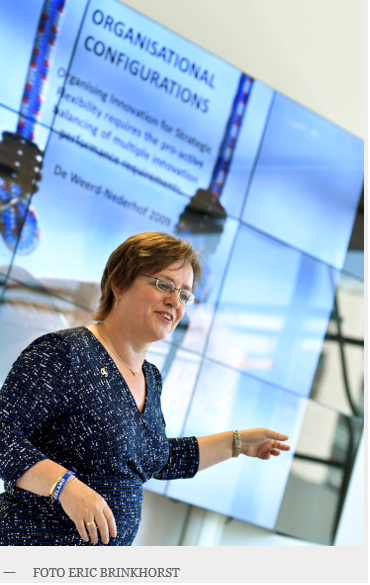Special session on Resilience, Innovation and Entrepreneurship at HTSF 2019!
As a good start of this new year, I would like to share with you the call for papers of the High Technology Small Firms (HTSF) Conference that will be hosted by my department NIKOS at the University of Twente on (26) 27-28 May 2019 here.

As one of the special tracks for this conference we have taken the initiative to organize a special session on resilience, innovation and entrepreneurship with the additional intention to work on the development of an edited book andto develop further ideas for an academic journal special issue.
Focus of the RIE special session is on getting a grasp on innovative organizing fostering resilient individual and team behaviour for sustained innovation and entrepreneurial performance. Thus, following up on ideas brought forward by BSI in their White Paper: “Organisational Resilience is the ability of an organization to prosper year on year in a dynamic, interconnected world”.
Examples are: individual resilience and innovative work behaviour, influence of entrepreneurial leaders’ personality on organizational resilience, innovation team resilience, resilient new organizational forms for small business.
The methodology can be quantitative and qualitative, conceptual or empirically based, using innovative combinations from innovation, entrepreneurship, organizational behavior and design, psychology and other social sciences, and transdisciplinary approaches are encouraged.
Contributions from scholars, professionals/industry and young researchers are welcome!
The deadline for abstract submissions is 15 February 2019 – which may be extended to 15 March 2019.
You can find the general information on the 2019 HTSF Conference and the Call for Papers, at https://www.utwente.nl/en/bms/nikos/events/HTSF2019
Background and rationale: ‘Making the world more entrepreneurial’ is the goal of the NIKOS/ ESIM department – the hosts of HTSF 2019- since its founding in 2001, while the University of Twente already prides itself of its entrepreneurial focus since 1986. Rigorous academic research, combined with an engaged scholarship approach, plays a key role in our pursuit of these ambitions. Over the past two years, ‘Entrepreneurial Behavior and Leadership’ has emerged as an important research theme at our department, next to ‘Technology Venturing & Entrepreneurship,’ and ‘Collaborative Innovation & Networks.’ Resilience plays an important role in relation to entrepreneurial behavior and leadership; and in its various forms constitutes an important research theme for the department, school and university. We have ongoing and new research efforts looking into (a) (the leadership of) resilient, innovative and/or entrepreneurial behaviors and mindsets amid uncertainty (be it inside or outside the organization), and (b) organizational design that supports such behaviors, while (c) considering the wider role and responsibility of business in society.
NIKOS researchers work with various conceptualizations of resilience, such as: organizational responses to external threats, organizational reliability, employee strengths, the adaptability of business models, or design principles that reduce vulnerabilities and disruptions (Linnenluecke, 2017; International Journal of Management Reviews; also see Williams et al. 2017; Academy of Management Annals). Examples of current and completed department projects at the crossroads of resilience, innovation, and entrepreneurship are: influence of entrepreneurial leaders’ personality on organizational resilience, innovation team resilience, resilience and integrity in the financial sector, entrepreneurs (non-)inclusion of disabled people, resilient online campaigning for nonprofits, resilient new organizational forms for small business, resilient organizing of IT infrastructures, entrepreneurs’ mental health as a source of resilience, entrepreneurs use of imagination for dealing with uncertainty, overcoming ofmarket barriers for healthy ageing technology, and resilient university-industry collaborations.
Rationale Special Session @HTSF 2019
The idea for the HTSF Special session proposal is rooted in the Resilience & Innovation research started by NIKOS Chair Petra de Weerd-Nederhof in 2017, much inspired by Isabella Hatak, Michel Ehrenhard and Marjolein Caniels – check out the blogposts of this blog since August 2017. Ideally, the special session and the book we may develop together takes us on a journey of three levels of innovation studies, which can be related to the importance of resilience:
1. the innovation journey concept, inspired by Andrew Van de Ven & his colleagues, who said that ‘Management cannot control innovation success, only its odds – the creation of circumstances and conditions – i.e. organizational forms – which enhance the chances of success. This will be going into an innovation eco-system perspective.
2. organizational configurations for innovation, based on contingency and strategic choice theories and process modelling – where we concluded that organizing innovation is an act of balancing the right organizational forms for exploitation and exploration, forms of ambidexterity (structural, spatial, sequential). Structures that enable balancing are also structures that enable resilience: bouncing back in times of adversity. One famous author on resilience, mindfulness, collective action and sensemaking in organisations is Karl Weick, and in his seminal paper on the Man Gulch disaster he stresses also the importance of balancing and flexible structuring of organisations, temporary systems, structuration, intergroup dynamics and teambuilding.
3. team and individual characteristics – some examples we already presented at an earlier special at the PDMA research forum in collaboration with Peter Oeij and this post in which I share some considerations on the topic.
Please, do not hesitate to contact us via p.c.deweerd@utwente.nl for any further information on the REI special session and cooperation for the book / ideas for a journal special.
We look forward to your submissions and to seeing you at UTwente next May!
Kind regards,
Petra de Weerd-Nederhof (University of Twente), Isabella Hatak (University of St Gallen and University of Twente), Marjolein Caniels (Open University)



